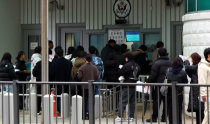[Focus] Electricity help to N. Korea pondered
[Focus] Electricity help to N. Korea pondered
Posted December. 19, 2000 14:01,
There are two ways to help North Korea, which is suffering from electric power shortage. Chung Woo-Jin, research fellow of the Korea Institute of Energy Economics, who has been studying ways of South-North cooperation in power industry, said that South Korea could send surplus power to North Korea or build power plants in North Korea by supplying construction materials required for doing so.
What North Korea wants is direct transmission of electricity for immediate supply. North Korea understands that South Korea has excessive power based on the figures that the South's power consumption dropped substantially shortly after the outbreak of the foreign exchange crisis. However, South Korean experts point out that it is impossible for South Korea to transmit power to the North under the current consumption structure. So it is unlikely that direct transmission of electricity to the North will be realized.
Currently, South Korea is capable of generating up to 42.87 million kilowatts. In summer, maximum power consumption reaches about 38.23 million KW, so there is around 4.64 million KW of surplus power, or 12.2 percent in reserve power. The Organization for Economic Cooperation and Development (OECD) recommends a 10-12 percent reserve power supply ratio, so South Korea is at an optimum level at the moment.
For this reason, industry experts say that it would be effective to supply power to North Korea in spring and fall when power consumption is slow on a limited scale or supply coal for power plant fuel and help Pyongyang improve its obsolete power generation and power transmission facilities.
North Korea's power industry relies largely on hydropower and coal-fired power plants. As its coal output has decreased substantially, the country is suffering from a crisis. South Korea's coal consumption is decreasing, but the government has been accumulating coal by purchasing it under the coal industry rationalization policy.
South Korea's coal reserve is estimated at about 8 million tons, which could be shipped to the North immediately under the decision of the government. If South Korea ship 5 million tons of coal to the North, North Korea's power generation could increase by as much as 42 percent.
North Korea has facilities for generating up to 7.39 million KW, but its actual production is limited to only 2 million KW because of fuel shortages and frequent failure of power plants.
Based on its production cost, 5 million tons of coal are valued at 500 billion won. If South Korea supplies 1 million tons, it would cost 100 billion won. There is a suggestion to build a power plant with generation capacity of 500,000 tons. However, it would take nearly five years and cost around 1 trillion won to built, so it is difficult to realize.
For this reason, some experts say that it would be rational to supply coal to North Korea and dispatch engineers to the North for replacement of plant facilities or repair of transmission cables. While others say that it would be better to link coal supply in exchange for allowing South Korea to catch fish in North Korean territories.
"Currently, we are studying all possible means to support, including direct transmission of power to the North, although nothing has been decided yet," said Lee Kang-Woo, head of the Power Industry Department of the Ministry of Commerce, Industry and Energy.







